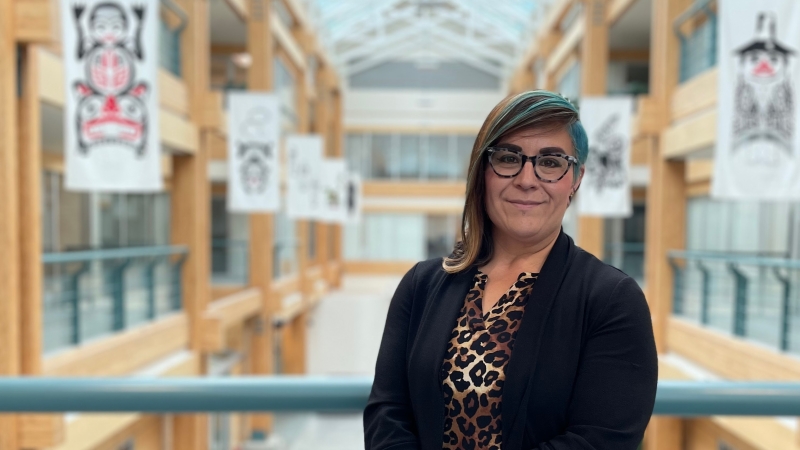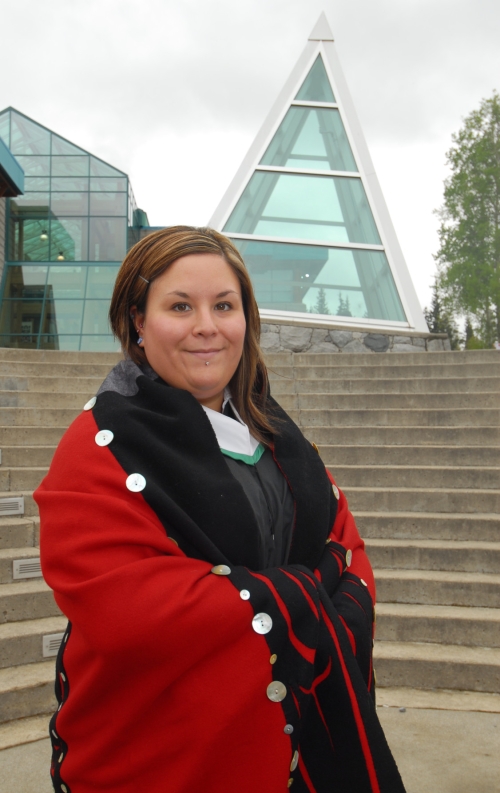Expanding minds, weaving knowledge
As we celebrate National Indigenous History Month, Dr. Jessie King (Hadiksm Gaax) shares her story of her time at UNBC, first as a student and now as an Assistant Professor in First Nations Studies.

To Dr. Jessie King (Hadiksm Gaax), life at university is about so much more than learning, it’s about planting seeds for the future and building a community.
King, who identifies as Ts’ymsen through her mother and mixed settler through her father, originally came to Lheidli T’enneh territory to complete a Bachelor of Science degree at UNBC in Prince George. She had been living abroad in Sweden and wanted to be closer to her family in Prince Rupert. She had every intention of returning home upon graduation.
Three degrees later and King is now an Assistant Professor in the Faculty of Indigenous Studies, Social Sciences and Humanities.
“We come into academia with the belief that we are here to sit down, listen and remember facts, formulas, dates, etcetera,” said King. “But what we’re really here for is expanding our minds, weaving together knowledges and creating lasting relationships.”
As we celebrate National Indigenous History Month, King said there is both a challenge and some comfort in knowing there is more work to be done to find new approaches to teaching and fostering respectful relationships. “At UNBC and in the larger community, my hope is to see conversations involving Indigenous Peoples always embedded. Their voices are always present, they are not an add-on or afterthought.”
“I hope this month inspires us to walk in a good way, to use what power and privilege we possess to hold space for Indigenous communities and to step aside when necessary.”
King discovered a hunger for learning at UNBC she didn’t know she possessed. “I wanted to keep going, keep learning and feeding my spirit,” she said. “It’s a space where I could, and still can, enrich myself, continue growing and create those lifelong connections.”
King was gifted with many mentors who repeatedly told her she was needed at UNBC. At the time she thought they were just being supportive, but she’s since realized they were paving the way for her to stay and return as a professor.
When offered the faculty position in 2020, she took it without hesitation. “It felt like a homecoming, though I never really left,” said King. “I found I could always depend on UNBC for opportunities. Our size and collective vision feels natural, it feels real and it never hurts to be seen.”
King’s dad knew she was meant to be at UNBC, telling her often in those early years she would have an office on campus in some fashion. “Being the daughter I was, I had to take the scenic route and he never did see me walk the halls as a professor, but I know he would be proud.”
 While completing her first degree in 2008, King’s parents consulted with the head of her mother’s side of the family in Gitxaala about bestowing a name on her with a button blanket depicting their clan, Ganhada (Raven).
While completing her first degree in 2008, King’s parents consulted with the head of her mother’s side of the family in Gitxaala about bestowing a name on her with a button blanket depicting their clan, Ganhada (Raven).
“To be given a name is a great honour for me, it ties me to my community and gives me an opportunity to celebrate all parts of my identity. So, I go by Jess or Hadiksm Gaax, which translates to Swimming Raven. I use both in my bio and in my signature, as they carry deep meaning to who I am.”
Photo: King wearing her button blanket at her 2011 graduation.
Drawing on her personal experiences, King said she hopes to offer a level of understanding to young Indigenous and non-Indigenous students entering post-secondary education at UNBC.
“Arriving on campus can be intimidating if you don’t see yourself reflected in the halls or classroom spaces. I didn’t know many Indigenous folks attending university until I walked into the First Nations Centre in 2005,” she said. “I hope I can walk beside them on their journey and be that support for each of them in finding their place and voice in academia. Watching someone find their place is a beautiful thing to witness. I’m forever grateful for those opportunities.”
As for what her students take away from her classes, King said a lot of the work in teaching First Nations Studies is heart work, which involves uncovering shared histories and treading lightly through traumatic conversations involving colonial history and intergenerational impacts.
She grew up with stories of Raven, the trickster, wandering through the world, getting into trouble and learning lessons. King uses the character of trickster as a tool in her teachings and when challenging conversations come up, she said those moments of discomfort are facilitated through engaging ethical and safe spaces with a willingness to explore two-eyed seeing.
“My hope is that students take away the tools for unpacking these conversations, questioning discomfort and that they feel brave in tackling critical dialogue aimed at transformation.”
King said she wants her students walk away with a hunger to keep going and see where they can grow.
“Learning is more than sitting in a classroom, it’s learning how to live and ‘be’ in a good way. Once you leave that classroom, you are walking out with a toolkit to make change. Hagwil yaan (Walk Gently), Algya̱̱xs yaan (Speak gently).”
